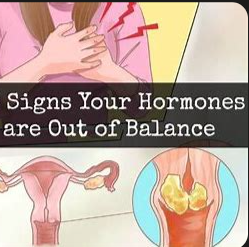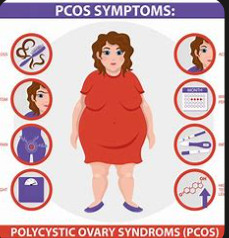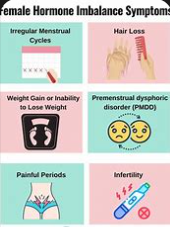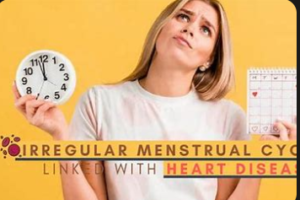When your body’s hormones are out of balance, it can feel like a rollercoaster. You might experience a fluctuating weight, feel tired all the time, notice your hair thinning, or even have heart palpitations. Bloating and menstrual irregularities can also occur, and some people assigned female at birth (AFAB) might see an increase in body hair. These symptoms can be triggered by various factors such as poor gut health, inflammation, stress, and substances that disrupt our endocrine system. But don’t worry, there are several ways to treat these imbalances, from medications and surgeries to natural approaches like adjusting your diet, improving your sleep, and taking supplements. It’s all about finding what works best for you.
How to know hormones are out of balance?

Feeling down or noticing a weight gain despite a healthy lifestyle? It’s easy to blame these changes on stress, aging, or societal pressures, but your hormones might be the hidden culprits. These chemical messengers, released by your endocrine system into your bloodstream, can cause a variety of issues like appetite changes, mood swings, metabolic problems, menstrual disruptions, sleep disturbances, and more. Let’s explore some signs that might suggest your body is dealing with a hormonal imbalance.
Sleepless Nights:-If you’re having trouble sleeping, it’s not just stress or a work-life imbalance at play. Hormones have a significant impact on your sleep. For women, as they age, the levels of estrogen and progesterone decrease. Estrogen, in particular, helps prevent sudden awakenings during sleep and promotes better sleep. So, a drop in these hormones can lead to poor sleep.
Mood Fluctuations:-Feeling irritable and blaming it on work deadlines? It might be worth considering that a decrease in estrogen hormone secretion can directly affect your mood, especially in women. Changes in estrogen levels during pregnancy, menopause, and serious illnesses can intensify symptoms of depression and negative moods.
Emotionally, hormonal fluctuations can impact mental health, contributing to conditions like PMS and PMDD. Menstrual health also empowers individuals in reproductive decision-making.

Acne Breakouts:-While pollution, lifestyle, and diet are often blamed for acne, hormonal imbalance is also a significant factor. Overproduction of hormones can increase sebum secretion, leading to inflammation, blocked pores, bacterial growth, and acne.

Irregular and Painful Periods:-While factors like obesity and unhealthy eating habits can disrupt your menstrual cycle, hormonal imbalance is another key contributor. Changes in estrogen levels can lead to fibroid formation, causing painful periods. Hormonal imbalance can also cause lower back pain, constipation, and headaches during menstruation.
Decreased Libido decrease in estrogen and testosterone secretion can lead to a lower libido and sexual receptivity, especially during menopause and with aging.

PCOS:-Polycystic Ovary Syndrome (PCOS) involves the development of small cysts in the ovary and can cause issues like excessive body hair, weight gain, and infertility. PCOS is primarily caused by genetics, lifestyle choices, and an increase in the male hormone androgen, which prevents the ovary from releasing eggs, leading to an irregular menstrual cycle.
Other signs, including hair loss, weight gain, and fertility issues, may also suggest a hormonal imbalance. If you’ve noticed these signs, it’s important to consult with your healthcare provider soon. Remember, your body is a complex system, and understanding it is the first step towards better health.
Why is prioritizing menstrual health important?

Prioritizing good period health is essential for overall well-being and reproductive vitality. Menstruation, a natural facet of the female reproductive cycle, serves as a crucial indicator of reproductive health. Tracking menstrual cycles is imperative for those planning conception or managing contraception effectively.
Hormonal balance, governed by interactions between estrogen and progesterone, is central. Irregular periods may signal underlying concerns, such as PCOS or thyroid disorders. Beyond reproduction, menstrual cycles influence bone health, impacting overall well-being.

Cardiovascular health is affected by hormonal shifts, with estrogen providing protective effects. Recognizing changes in menstrual patterns is vital for the early detection of health issues necessitating prompt medical attention.
Addressing menstrual health concerns enhances the overall quality of life. Regular check-ups, communication with healthcare providers, and self-awareness are key to maintaining good period health. Persistent issues warrant consultation with a healthcare professional for proper diagnosis and management.











